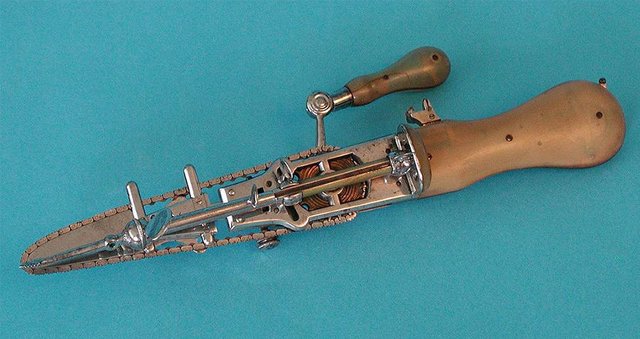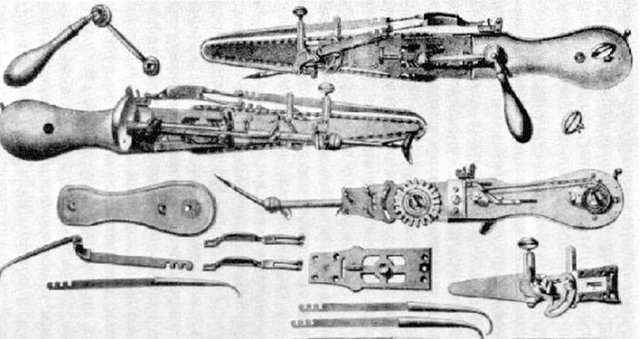Ouch! The Chainsaw Was Originally Invented To Deliver Babies
By Katie Serena on October 16, 2017
The original chainsaw was used in a symphysiotomy, the preferred method for quickly removing a child from a woman’s womb for almost three centuries.
The original osteotome.
Before it became the horror-movie murder weapon of choice or the preferred method of chopping down trees, the chainsaw was actually intended to be used in medicine.
Specifically, to aid in childbirth.
Even though women had been birthing babies since the literal dawn of time, childbirth in the late 18th century was still pretty messy. Anesthesia was still a few years from being perfected, and hospital hygiene was less than up to snuff, not to mention that human beings weren’t as healthy as they are today.
Because of this, anytime a woman came in with complications during labor it could be life-threatening.
Caesarean sections were considered dangerous because of the high risk of infection, so if a woman could not birth a child naturally, doctors were forced to try alternative methods.
One of these methods was a symphysiotomy.
Popularized in 1597, the symphysiotomy was the preferred method for quickly removing a child from a woman’s womb for almost three centuries — though it is now, thankfully, almost entirely denounced by medical professionals.
During the procedure, a doctor would take a knife and separate the cartilaginous muscle that connects the pubic symphysis to widen the birth canal.
In short, he would cut the woman’s pelvis in half.

Medical journal drawings of osteotomes, describing the inner workings.
In the mid-1780s two Scottish doctors, John Aitken and James Jeffray, realized that using a knife for a symphysiotomy was time-consuming, often inaccurate, and excruciatingly painful for the patient. In an effort to improve the procedure for everyone, they created a device that would ensure more precision during the cutting, by using a chain that enforced repetitive movements.
And thus, the precursor to the modern chainsaw was invented.
Initially, the chainsaw consisted of a long chain with serrated teeth, and a handle on each end, similar to a wire saw. The chain would then be wrapped around the pelvic bone, and a doctor would alternate pulling each handle. The movements would slice through the symphysis faster than a knife, and with more precision.
Eventually, an orthopaedist named Bernhard Heine improved their invention when he came up with something called an osteotome.
Now powered by a hand crank rather than alternated pulling, the serrated chain was looped around a guiding blade, which allowed it to rotate. This allowed the doctor to hold the chainsaw similarly to a knife, but with the newfound precision of the serrated chain.
After anesthesia was popularized, the chainsaw’s use in symphysiotomies was widely accepted and even encouraged. Due to its efficiency, it eventually became widely used in other surgeries and dissections as well.
Around the turn of the century, however, the symphysiotomy began losing support. A rise in hospital hygiene and general anesthesia made c-sections safer, and doctors realized there was less risk of long-term complications. After all, recovering from a broken pelvis took a lot longer than recovering from a few stitches, and you were more likely to be able to walk after a c-section.
However, though they were less useful for surgeries, a San Francisco-based logger realized they could be used for felling giant redwood trees. He modeled his patent for the “endless-chain saw” on Heine’s original osteotome, and applied for a patent in 1905.
From there, other inventors and logging tycoons tweaked and remodeled the chainsaw into what we have today — which, thankfully, is no longer used on humans.

Hi! I am a robot. I just upvoted you! I found similar content that readers might be interested in:
http://all-that-is-interesting.com/symphysiotomy
Congratulations @ssmm1582! You have completed some achievement on Steemit and have been rewarded with new badge(s) :
Click on any badge to view your own Board of Honor on SteemitBoard.
For more information about SteemitBoard, click here
If you no longer want to receive notifications, reply to this comment with the word
STOPCongratulations @ssmm1582! You received a personal award!
You can view your badges on your Steem Board and compare to others on the Steem Ranking
Do not miss the last post from @steemitboard:
Vote for @Steemitboard as a witness to get one more award and increased upvotes!